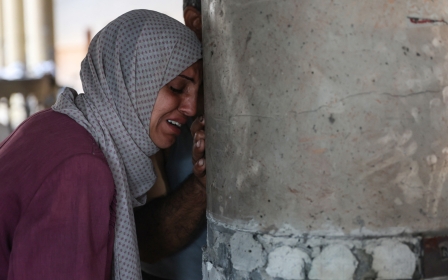Fitch downgrades Israel's credit rating, says Gaza war may last 'well into 2025'

Credit rating agency Fitch downgraded Israel’s Long-Term Foreign-Currency (LTFC) Issuer Default Rating (IDR) to A on Monday, a drop from A+.
The agency once again gave the country a negative outlook, meaning a further downgrade is possible.
Fitch attributes its decision to the continuation of Israel’s war on Gaza, which has so far killed over 39,000 Palestinians.
“The downgrade to ‘A’ reflects the impact of the continuation of the war in Gaza, heightened geopolitical risks and military operations on multiple fronts,” Fitch said, adding that it projects a budget deficit of 7.8 percent of GDP in 2024.
Fitch cites the rise in regional tensions following the deadly attack in the occupied Golan Heights’ Majdal Shams on 27 July, which killed 12 children, as well as Israel’s assassination of a top Hezbollah commander in Beirut and its suspected killing of Hamas leader Ismail Haniyeh in Tehran, as contributors to the negative outlook.
New MEE newsletter: Jerusalem Dispatch
Sign up to get the latest insights and analysis on Israel-Palestine, alongside Turkey Unpacked and other MEE newsletters
“In our view, the conflict in Gaza could last well into 2025 and there are risks of it broadening to other fronts. In addition to human losses, it could result in significant additional military spending, destruction of infrastructure and more sustained damage to economic activity and investment, leading to a further deterioration of Israel’s credit metrics,” it added.
The agency believes the budget deficit may be reduced to 4.6 percent of GDP in 2025 due to lower military spending and revenue growth, but the number could increase should the war continue.
Regardless, Israel is expected to permanently increase military spending by 1.5 percent in comparison with pre-war levels, adding pressure on the budget deficit and debt levels.
Israel’s debt-to-GDP is expected to rise to 70 percent in 2024 and 72 percent in 2025, which would surpass the pandemic peak of 71 percent in 2020. Debt could remain on an “upwards trend” if military spending increases, and macroeconomic uncertainties remain.
Responding to Fitch’s decision, the office of Prime Minister Benjamin Netanyahu said: "The Israeli economy is strong and is functioning well. The lowering of the rating is a result of Israel having to cope with a multi-front war that was forced on it. The rating will be raised again when we win – and we will win."
Israel’s Finance Minister Bezalel Smotrich said it was "natural” amid the war on Gaza and insisted that the country’s economy was strong.
“Israel is in the midst of an existential war - the longest and most expensive in its history,” he said in a statement. “The war is being waged on several fronts and has been going on for almost a year.”
Yali Rothenberg, the finance ministry’s top accountant, said that Israel must formulate a state budget for 2025 as soon as possible that would rebuild fiscal reserves through a gradual decrease of the country’s debt-to-GDP.
Smotrich said the government will “pass a responsible [2025] budget that will continue to support all the needs of the war while maintaining fiscal frameworks and promoting growth”.
Middle East Eye delivers independent and unrivalled coverage and analysis of the Middle East, North Africa and beyond. To learn more about republishing this content and the associated fees, please fill out this form. More about MEE can be found here.





